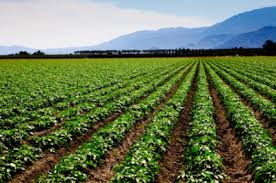The revenue generated by the agricultural sector in Nigeria has been so low; many have rightly feared that agriculture in Nigeria might never return to how it was in the past – especially before the oil boom. Problems of agriculture in Nigeria have been and will always be linked to bad leadership, mismanagement, wrong setting of priorities and neglect from the government.
It is very surprising to imagine that Nigeria depended solely on agriculture as the main source for revenue generation via the export of cash crops. Which among many, includes Groundnut, Cashew-nut, Cotton, Millet, and of course Cocoa.

A lot of factors have combined to forcefully set the agriculture on a nose dive.Those factors include:
-
Neglect on the Part of the Government
Right from the 1970’s, after the oil boom, the government’s investment in the oil sector has not returned to the way it was and it has in turn bore a hole in the heart of the agricultural sector of the economy. The sector that was once responsible for over 75% of the national GDP, after neglect on the part of the government, now contributes to below 25% of the GDP.
-
Low Provision of Mechanical Equipments
If the government is truly going to be practical about investing in the agricultural sector, then the provision of advanced mechanical equipments to replace the manual technique is going to be a really good statement of intent. Truth be told, a lot of farms in the country still make production via the manual method and it doesn’t take rocket science to know that a really deep problem is manual agricultural production.
-
Lease of Land for Agriculture
More portions of land should be allocated for farming, wildlife and forestry. Land tenure agreements should be created by the government to help ensure more efficient use of agricultural land. Farmers should also be encouraged to come together and form large farms, as this would also lead to more adequate and lenient use of farmland.
-
Inadequate Social Amenities
There are points where every sector of the economy is intertwined and the lack of basic infrastructure and basic amenities makes not only the production but the transportation of agricultural production more tedious than it is. Adequate provision of social amenities and basic infrastructure will definitely ease the tension on agricultural production. The funny thing though, is that agricultural production has a very strong tendency of providing the capital needed for the provision of social amenities.
-
Inadequate Finance
There have been continuous discrepancies over the amount of loan given out by the government on paper and media, and the amount that actually gets to agricultural entrepreneurs. Finance (Money/Capital) needs to be provided by the government by setting up special local banks to extend grants and loans to agricultural entrepreneurs. Agricultural Co-operatives and microfinance banks should be set up by the Federal Government to help established farmers, willing to join the agricultural production train in Nigeria.
-
Ineffective Tax Relief
Tunisia is one of the richest countries in Africa, and theirs’ is 0% tax on agriculture. If there can be adequate and real tax relief on agriculture in Nigeria, it can further boost the morale of prospective entrepreneurs and also further encourage farmers. Capitals can be raised for a lot of production incurred expenses.
-
Low Literacy Rate
One of the problems facing agriculture in this country is the low literacy rate of the farmers. This fact alone makes the agricultural sector less fanciful for youths to want to dabble into. Asides from creating general education for the farmers, the government should also try to enlighten farmers on how to use the mechanical method to boost production. Also enlighten them on how use fertilizers and how to select healthy seeds for planting.
The agricultural sector in Nigeria sure still has a long way to go to reclaim the glory days, as there are still lots of challenges Nigeria needs to overcome. The collective efforts of the government and agricultural entrepreneurs can help push up this very critical sector of the economy back on an upward movement.